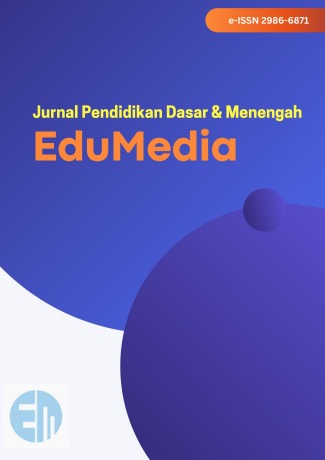Benefits of AI-Based Application in Facilitating English Learning
DOI:
https://doi.org/10.69743/edumedia.v3i2.48Kata Kunci:
AI applications, EFL learning, vocabulary development, receptive skills , adaptive learningAbstrak
This study investigates the role of Artificial Intelligence (AI) applications in enhancing vocabulary acquisition and receptive skills—specifically reading and listening—in English language learning. Focusing on three widely used platforms—Memrise, Cake, and Duolingo—a literature review of 21 peer-reviewed sources was conducted. Findings indicate that Memrise effectively supports vocabulary retention through spaced repetition and native speaker input, Cake addresses listening comprehension challenges via authentic, adaptive video materials, and Duolingo promotes vocabulary growth and reading fluency through gamified, personalized learning. Collectively, these AI tools foster learner autonomy, sustain motivation, and create flexible, engaging learning environments. The study underscores the importance of strategically integrating AI technologies into English as a Foreign Language (EFL) instruction to address diverse learner needs and improve learning outcomes.
Unduhan
Referensi
Ajisoko, P. (2022). Using Duolingo Apps To Improve English Reading Comprehension of Engineering Students in Universitas Borneo Tarakan. Exposure : Jurnal Pendidikan Bahasa Inggris, 11(1), 1–6. https://doi.org/10.26618/exposure.v11i1.6452
Aprizal, A. D., & Wachyudi, K. (2024). The effectiveness of Memrise as a vocabulary learning tool: A literature review. Jurnal Ilmiah Wahana Pendidikan, 10(4), 8–17. https://doi.org/10.5281/zenodo.10499120
Asi, N., Fauzi, I., Lestari, A., Mardiana, D., & Amalia, N. (2024). Exploring the Experience of EFL Learners on a Website for Language Learning to Practice Speaking English. Journal of English Teaching and Learning Issues, 7(2), 107-120. https://doi.org/10.21043/jetli.v7i2.26667
Chen, S., & Le, T. T. (2021). The TESOL research training journey: voices from international PhD students. Routledge.
Dakhi, S., & Fitria, T. N. (2019). The Principles and the Teaching of English Vocabulary: A Review. JET (Journal of English Teaching), 5(1), 15. https://doi.org/10.33541/jet.v5i1.956
Dewi, N., & Sulistyawati, M. E. S. (2024). Pemanfaatan Teknologi Pembelajaran Adaptif dalam Bahasa Inggris untuk Generasi Digital: Sebuah Analisis Komprehensif. Intelektium, 4(2), 71–76. https://doi.org/10.37010/int.v4i2.1438
Elmotri, B., Osman, O., Garrouri, S. S., Elyasa, Y. M., Amri, F., Rabeh, M. D., ... & Embadi, S. (2025). Unlocking language proficiency: A comprehensive comparison of Duolingo and Oxford English Coach effectiveness in language learning. Mediterranean Journal of Social Sciences, 16(1), 22–39. https://doi.org/10.36941/mjss-2025-0003
Fauzi, I., Hartono, R., Widhiyanto, W., & Pratama, H. (2022). Web-based language learning: Benefits for enhancing EFL learners’ speaking skill. In International Conference on Science, Education, and Technology. October 2022 (Vol. 8, pp. 192-196). https://tinyurl.com/bdee6y9d
Fauzi, I. (2024). MALL in English Language Teaching: The Instructional Model of Integrating Four Skills Facilitated by WhatsApp Application. In Proceeding International Conference on Education. October 2024 (pp. 141-149). https://jurnalfaktarbiyah.iainkediri.ac.id/index.php/proceedings/article/view/2732
Fauzi, I., Hartono, R., Rukmini, D., & Pratama, H. (2025). AI Applications for EFL Learners: Enhancing Speaking Performance and Reducing Anxiety with Gender-Based Analysis. Forum for Linguistic Studies, 7(9), 282–301. https://doi.org/10.30564/fls.v7i9.10192
Golub, T. P., Kovalenko, O. O., Nazarenko, O. I., & Zhygzhytova, L. M. (2024). The role of Duolingo in English teaching and learning in higher education. Academic Studies. Series “Pedagogy”, 1(1), 4–9. https://doi.org/10.52726/as.pedagogy/2024.1.1
Jiang, Y., & Dewaele, J. M. (2019). How unique is the foreign language classroom enjoyment and anxiety of Chinese EFL learners? System, 82, 13-25.
Khalaf, B. K., & Zin, Z. B. M. (2018). Traditional and inquiry-based learning pedagogy: A systematic critical review. International Journal of Instruction, 11(4), 545–564. https://doi.org/10.12973/iji.2018.11434a
Kristiawan, D., Bashar, K., & Pradana, D. A. (2024). Artificial intelligence in English language learning: A systematic review of AI tools, applications, and pedagogical outcomes. The Art of Teaching English as a Foreign Language (TATEFL), 5(2), 207–218. https://doi.org/10.36663/tatefl.v5i2.912
Laličić, A., & Dubravac, V. (2021). The role of reading in English language classrooms. MAP Social Sciences, 1(1), 23–36. https://doi.org/10.53880/2744-2454.2021.1.1.23
Lobanova, O., Fedorova, E., Vobolevich, A., Minakova, P., & Rybakova, L. (2024). Virtual reality technologies for learning English: An example of using Immerse. International Journal of Evaluation and Research in Education (IJERE), 13(6), 4409-4419.
Masduqi, H. (2016). Integrating Receptive Skills and Productive Skills into a Reading Lesson. The 2nd International Conference on Teacher Training and Education, 2(1), 507–511. https://jurnal.uns.ac.id/ictte/article/view/7476
Mirdad, M., Halim, A., & Abidin, A. (2023). Students’ perceptions of Memrise app use in learning vocabulary. Journal of English Language Studies, 4(2), 78–87.
Muttaqin, M. I., Zuhdi, H., & Ridwan, R. (2025). The use of gamification-based Duolingo application in increasing student motivation is reviewed from the theory of self-determination. Al-Wijdān: Journal of Islamic Education Studies, 10(1), [Article 5844]. https://doi.org/10.58788/alwijdn.v10i1.5844
Nguyen, N. L., & Nguyen, T. (2025). The impact of implementing AI-generated audio transcriptions on English majors’ cognitive load. AsiaCALL Online Journal, 16(1), 67–79. https://doi.org/10.54855/acoj.251617
Nurani, E. S. D., Fikri, D., & Rahmawati, H. (2023). English students' perceptions of the use of Memrise application in learning English vocabulary independently. Jurnal Pendidikan dan Pembelajaran (JP3), 18(18), 1–15.
Nushi, M., & Orouji, F. (2020). Investigating EFL teachers’ views on listening difficulties among their learners: The case of Iranian context. SAGE Open, 10(2). https://doi.org/10.1177/2158244020917393
Prabawati, A., AM, S. A., & AM, S. A. (2021). The Students ’ Perception of the Online Media Used By. English Language Teaching Methodology, 1(3), 169–181.
Putri, R.E.A., & Siregar, Y.D. (2024). Enhancing English Listening Skills: a Case Study of the Cake Application in Student Learning. Eduvest-Journal of Universal Studies, 4(4), 1767–1779. http://eduvest.greenvest.co.id
Rohim, R. F., Gumelar, R. E., & Riandi, R. (2022). The effect of Memrise application towards students’ vocabulary mastery. Journal of English Language Learning (JELL), 6(2), 194–198.
Salawazo, I. S., Simbolon, M., Hutabarat, V. E., Veronika, A. N., & Saragih, E. (2020). Analysis of students’ vocabulary in learning English. Linguistic, English Education and Art (LEEA) Journal, 3(2), 469-475.
Uzer, Y. V. (2016). Teaching Listening by using Information Transfer Diagram Activity to the Seventh Grade Students of the State Junior High School 43 of Palembang. ELTE Journal (English Language Teaching and Education), 6(1), 45–53.
Zohoorian, Z., Noorbakhsh, M., & Zeraatpishe, M. (2022). EFL learners’ vocabulary achievement and autonomy: Using Memrise mobile application. Indonesian Journal of EFL and Linguistics, 7(2), 233–249. https://doi.org/10.21462/ijefl.v7i2.487
Unduhan
Diterbitkan
Cara Mengutip
Terbitan
Bagian
Lisensi
Hak Cipta (c) 2025 Alvionita Damayanti, Roni Kurniawan, Astrid Shalli Anziila, Titik Rahmawati, Rafi, Iwan Fauzi

Artikel ini berlisensi Creative Commons Attribution 4.0 International License.













